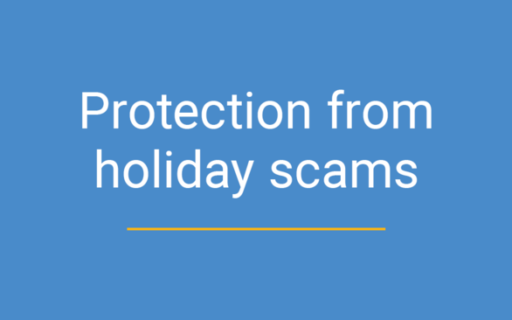Financial scams are a serious problem that can cause significant damage to individuals and families. Scammers are becoming increasingly sophisticated and can easily trick people into giving away their hard-earned money. This guide will outline steps to protect yourself from financial scams.
Identifying Financial Scams

The first step in protecting yourself from financial scams is to know how to identify them. Financial scams come in many forms, but some common ones include phishing, investment, and charity scams.
Phishing scams involve scammers posing as legitimate companies or organizations and asking for personal information, such as passwords or credit card numbers. Investment scams involve scammers offering high returns with low risk, while charity scams involve scammers asking for donations for fake charities.
Protecting Yourself from Financial Scams
Once you know how to identify financial scams, there are several steps you can take to protect yourself. Firstly, always be cautious when dealing with unsolicited emails, phone numbers, calls, or texts.
For example, if you receive a call or message from someone claiming to be from your bank or credit card company, do not give them any personal information. Instead, call your bank or credit card company directly using the phone number on their official website or the back of your card.
Secondly, never click on links in unsolicited emails or messages. These links can lead to fake websites that are designed to look like legitimate ones. Instead, always go directly to the website by typing in the URL or using a bookmark.
Thirdly, be wary of investment opportunities, products, or services that sound too good to be true. Always research and check the credentials of the person or company offering the investment. You can also check with the Securities and Exchange Commission (SEC) to see if the investment is registered.
Fourthly, be cautious when donating to charities. Always research the charity first and make sure it is legitimate. You can use websites such as Charity Navigator to help you find legitimate charities.
Finally, constantly monitor your bank account, credit or debit card, and charges for any suspicious activity. If you see anything unusual, immediately report it to your bank or credit card company.

Additional Tips to Protect Yourself
- Keep your computer and mobile devices up to date with the latest security updates and anti-virus software.
- Use strong, unique passwords for each of your online accounts.
- Enable two-factor authentication for added security.
- Never give out personal information over unsecured Wi-Fi networks.
- Be cautious of job scams that ask you to pay upfront fees or provide personal information.
- Be wary of any unsolicited job offers or work-from-home opportunities.
- Don’t fall for a prize or lottery scams that require you to pay a fee to claim your prize.
- Always read the fine print and terms and conditions before signing up for any services or offers.
- If you are unsure or suspect a scam, trust your gut and take the necessary precautions.

How to Protect Yourself from Financial Scams
Financial scams can happen to anyone, and the consequences can be devastating. Unfortunately, scammers are constantly finding new ways to trick people out of hundreds of millions of their hard-earned money, so it’s important to stay vigilant and know how to protect yourself.
In this article, we’ll provide you with some tips to help you safeguard your finances and avoid falling victim to financial scams.
Recognize the Signs of a Scam The first step to protecting yourself from financial scams is to know what to look out for. Some common warning signs of a severe investment scam may include the following:
- Offers that seem too good to be true
- Requests for personal or financial information
- Unsolicited calls or emails asking for money or personal information
- Pressure to act quickly or make a decision on the spot
- Offers that require upfront payment or fees
If something seems suspicious, it’s important to take a step back and research before proceeding.
Protect Your Identity
Identity theft is a common financial scam, so protecting your identity is essential. Some ways to do this include:
- Checking your credit report regularly to look for any suspicious activity
- Shredding any documents that contain personal information before throwing them away
- Being cautious of phishing scams, where scammers try to trick you into giving out personal information through fake websites or emails
- Using strong, unique passwords for each of your online accounts
- Never giving out personal information over the phone or email, especially to someone you don’t know
Stay Up-to-Date on Scams
Scammers always find new ways to trick people, so staying up-to-date on the latest scams is important. Some ways to do this include:
- Signing up for scam alerts from organizations like the Federal Trade Commission (FTC) or Better Business Bureau (BBB)
- Keeping an eye on news headlines for any new scams that may be going around
- Staying informed about common scams in your area or industry
By staying informed, you can be better prepared to recognize and avoid financial scams.
Know Your Rights If you fall victim to a financial scam, knowing your rights is essential. Some steps you can take include:
- Reporting the fraud to the appropriate authorities, such as the FTC or your local police department
- Contacting your bank or credit card company to report any unauthorized charges
- Freezing your credit to prevent any further fraudulent activity
- Seeking legal advice or assistance if necessary
These steps can help you recover any lost funds and prevent further damage to your finances.

At David T Rosen, we are committed to ensuring our readers are well-informed and protected from financial scams. We understand that financial fraud can devastate individuals and businesses, and we take the responsibility of seriously educating our readers on this issue.
This comprehensive guide will give you everything you need to know to protect yourself from financial scams while shopping online. From identifying common types of scams to learning how to safeguard your personal and financial information from online shopping scam others, we have you covered.
Identifying Common Types of Financial Scams
Financial scams come in many forms, and scammers consistently devise new ways to deceive their victims for easy money. However, there are some common types of scams that you should be aware of:
- Phishing Scams – Phishing scams are fraudulent attempts to obtain sensitive information, such as login credentials and credit card details. Scammers often use emails, text messages, and fake websites to trick their victims into providing this information.
- Investment Scams – Investment scams are schemes that promise high investment returns but are designed to defraud investors. These scams can take many forms, such as Ponzi, pyramid, and pump-and-dump schemes.
- Tech Support Scams – Tech support scams are fraudulent attempts to convince individuals that their computer has a virus or other problem and then offer to fix the problem for a fee. Of course, the laptop has nothing wrong; scammers are simply trying to steal money.
- Lottery and Sweepstakes Scams – Lottery and sweepstakes scams are schemes that claim the victim has won a large sum of money but must pay a fee to collect their winnings. In reality, there is no prize, and the scammers are simply trying to steal money from their victims.
Safeguarding Your Personal and Financial Information
Protecting your personal and financial information is crucial in preventing financial scams. Here are some steps you can take to safeguard your personal financial information:
- Use Strong Passwords – Use strong, unique passwords for all your online accounts, and avoid using the same password for multiple accounts. In addition, consider using a password manager to keep track of your passwords securely.
- Be Cautious of Unsolicited Emails – Be cautious of unsolicited emails that ask for personal or financial information. Legitimate companies will never ask for sensitive information via email.
- Avoid Public Wi-Fi – Avoid using public Wi-Fi when accessing sensitive information, such as online banking or credit card accounts. Public Wi-Fi can be easily compromised, allowing hackers to intercept your data.
- Monitor Your Accounts – Regularly monitor your financial accounts for any unusual activity, such as unauthorized transactions or changes to your personal information.
- Keep Your Software Up to Date – Keeping your software up to date can help protect you from security vulnerabilities that scammers may exploit. Regularly update your operating system, web browser, and other software.
- Use Two-Factor Authentication – Two-factor authentication adds an extra layer of security to your online accounts by requiring a second form of authentication, such as a code sent to your phone or email. Enable two-factor authentication whenever possible to protect your accounts.
- Be Skeptical of Unsolicited Phone Calls – Be wary of unsolicited phone calls from individuals claiming to be from a bank or government agency. Scammers often use this tactic to trick their victims into providing personal or financial information.
- Check URLs Carefully – Before entering any personal or financial information online, carefully check the website’s URL. Scammers often use fake websites that look legitimate but have slightly different URLs, such as using “PayPal” instead of “PayPal.”
- Research Companies and Individuals – Research before investing money or doing business with a company or individual. Check for reviews and complaints online, and verify that the company or individual is legitimate.
Following these tips can significantly reduce your risk of financial scams. At David T Rosen, we are committed to providing our readers with the information and resources they need to protect themselves from fraud. If you suspect you have been the victim of a financial scam, report it to the appropriate authorities immediately.

Here are some tips that can help you protect yourself from financial scams:
Be Wary of Phishing Emails – Phishing emails are designed to look like legitimate emails from a reputable company, such as a bank or online retailer.
However, these emails often contain a link or attachment that, when clicked, can infect your computer with malware or direct you to a fake website that collects your personal or financial information.
To protect yourself, be wary of emails that ask you to click on a link or provide personal information.
Use Strong Passwords – Strong passwords that are difficult to guess can help protect your bank account information from identity theft and your online accounts from unauthorized access. Use a combination of upper and lowercase letters, numbers, and symbols, and avoid using the same password for multiple accounts.
Monitor Your Credit Report – Checking your credit report regularly can help you detect any unauthorized activity, such as accounts opened in your name without your knowledge. You can request a free credit report once a year from each of the three major credit bureaus: Equifax, Experian, and TransUnion.
Be Careful about What You Share Online – Be mindful of your social security number and the information and account passwords you share online, especially on social media.
Scammers can use this information to impersonate you or guess your passwords. Also, avoid sharing personal data online, such as your full name, address, or date of birth.
Keep Your Software Up to Date – Keeping your software up to date can help protect you from security vulnerabilities that scammers may exploit. Regularly update your operating system, web browser, and other software.
Use Two-Factor Authentication – Two-factor authentication adds an extra layer of security to your online accounts by requiring a second form of authentication, such as a code sent to your phone or email. Enable two-factor authentication whenever possible to protect your accounts.
Be Skeptical of Unsolicited Phone Calls – Be wary of unsolicited phone calls from individuals claiming to be from a bank or government agency. Scammers often use this tactic to trick their victims into providing personal or financial information.
Check URLs Carefully – Before entering personal or financial information online, check the website dating app’s URL carefully. Scammers often use fake websites or online ads that look legitimate but have slightly different URLs, such as using “PayPal” instead of “PayPal.”
Research Companies and Individuals – Research before investing money or doing business with a company or individual. Check for reviews and complaints, search online, and verify that the company, product sales, or individual are legitimate.

Conclusion
Protecting yourself from financial scams requires awareness and vigilance. By understanding common types of scams and taking steps to safeguard your personal and financial information, you can significantly reduce your risk of falling victim to fraud. At David T Rosen, we are committed to providing our readers with the resources they need to protect themselves from financial scams.